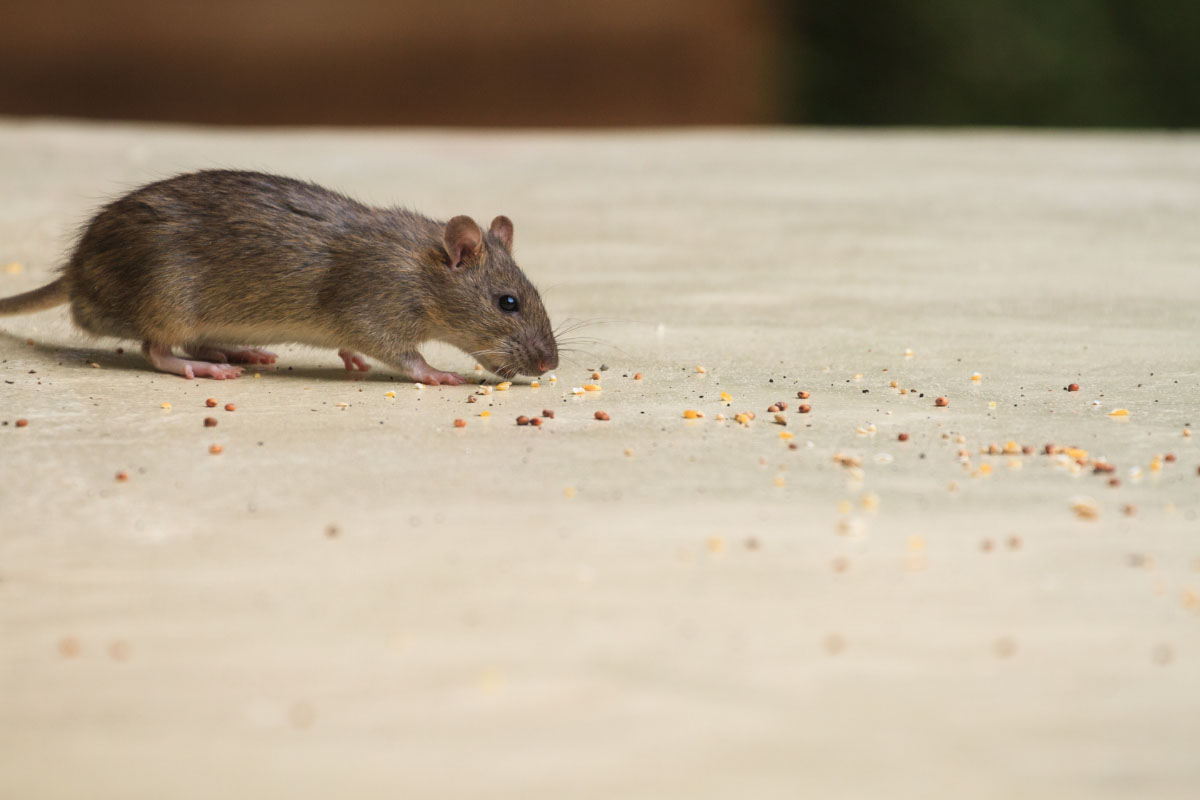- CALL US: 905.318.1242
House Mouse
The house mouse (mus domesticus) is everywhere. You’ll find them in fields, forests, marshes, urban areas and even parts of Antarctica. They are small, with an adult body length of three to four inches and a tail that adds an additional two to four inches to their overall size. Wild house mice vary in color from light brown and grey to black, and weigh an average of 40 to 45 grams.
Diet
House mice eat all kinds of food, making them the consummate omnivores. In the wild, they eat berries, nuts, seeds and other forms of natural grains, which gives them an affinity for various crops in agricultural regions. In urban areas, they also eat insects like houseflies and cockroaches as well as human and domestic animal food.
House mice visit their food sources, which are within 10 to 20 feet of their nesting area, several times per night. If you’ve noticed evidence of mice in your kitchen, their colony is not too far away. Well-fed mice will breed quickly, so it is essential that you take pest control measures as soon as you notice signs of an infestation.
Where to find them
Being hardy creatures, house mice can be found in practically every climate or landscape. In the wild, they usually create underground burrows to protect themselves from predators. Once they get into manmade structures like homes, garages and barns, they go into the walls or beneath floorboards and create nests from paper, insulation and other readily available materials.
Reproduction rate
House mice live in colonies with a dominant male and several females. Female mice go into estrus 72 hours after being exposed to male urine. Once mated, they give birth to anywhere from three to 14 babies, and can have up to 10 litters a year, which is why their populations expand so quickly. Young house mice become sexually mature at six weeks of age (for females).
Common diseases
Like rats, house mice can transmit diseases. They include:
- Leptospirosis, which can be transmitted by the urine of an infected mouse
- Salmonella, which can result when mouse feces come into contact with human food sources
- Lymphocytic choriomeningitis (LCMV), a viral infectious disease primarily carried by the house mouse and transmitted through exposure to fresh urine, saliva, droppings or nesting materials
Signs of an infestation
Although mice are most active in the evening, they leave signs of their presence that you can spot any time. They include:
- Small, pellet-sized droppings
- Footprints and tail marks on dirty or dusty surfaces
- Teeth marks on food containers, wood structures and even electrical wires (which can create a fire hazard)
- Chewed and torn books or newspapers, which serve as nesting material
- Openings in the walls that may have been chewed to make them wider
- Distinct urine odour
How to keep them out of your home
House mice are extremely small, so keeping them out means paying attention to the tiniest openings. Seal any gaps around pipe, wire, or cable entry points into the home before taking measures like the following:
- Spritz peppermint oil in areas known to be favoured by mice. Use this control method only if you don’t have pets in the home, as peppermint oil can cause respiratory issues in cats and dogs.
- Store food in the refrigerator or containers made from glass or metal. Mice can and will chew through cardboard and plastic.
- Do some landscaping to remove any hedges or shrubbery up against the house, so mice have fewer places to hide.
- Install chimney screens and gutter guards.
- Install weather stripping around your doors and windows.
- Keep food waste and household garbage in tightly sealed containers until collection day.
Need house mouse control services?
DIY measures like laying traps and poison can combat the early stages of an infestation, but unlike woodrats, mice live in colonies that can rapidly expand. They are not cautious about unfamiliar objects, so they can be enticed into a trap, but their sheer numbers make professional intervention advisable.
At Action Pest Control, we have been providing homeowners in and around Hamilton, Burlington and Oakville with house mouse extermination services for several years. We will identify points of entry so that you can take corrective measures right away and deal with the existing infestation using methods that don’t pose a risk to your family or pets. Let us help you eliminate an unsanitary nuisance that could also have a negative impact on the property value of your home. For more information or to schedule immediate assistance, contact Action Pest Control today.







